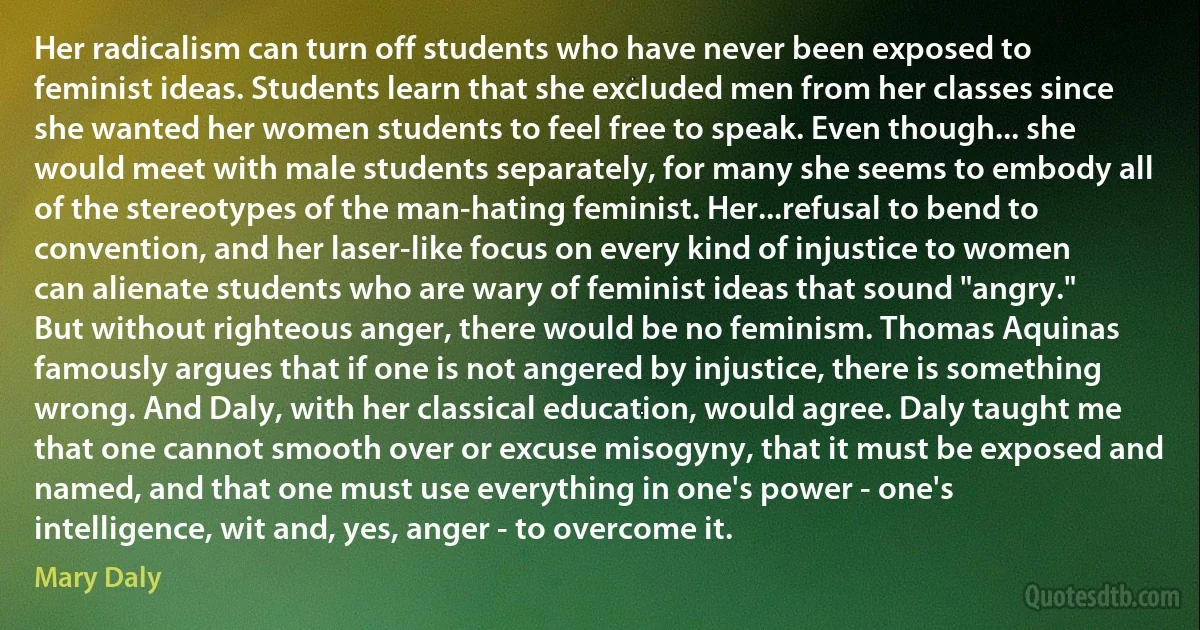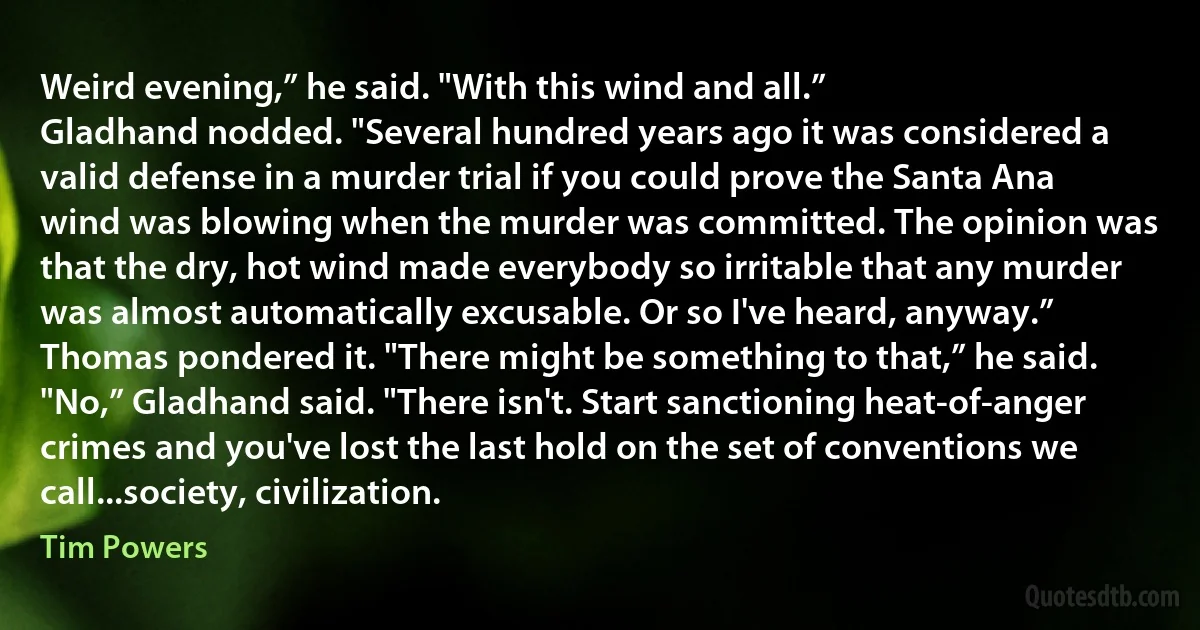Thomas Quotes - page 14
First, is the danger of futility: the belief there is nothing one man or one woman can do against the enormous array of the world's ills - against misery, against ignorance, or injustice and violence. Yet many of the world's great movements, of thought and action, have flowed from the work of a single man. A young monk began the Protestant Reformation, a young general extended an empire from Macedonia to the borders of the earth, and a young woman reclaimed the territory of France. It was a young Italian explorer who discovered the New World, and 32-year-old Thomas Jefferson who proclaimed that all men are created equal. "Give me a place to stand," said Archimedes, "and I will move the world." These men moved the world, and so can we all.

Robert F. Kennedy
Helen Thomas
I think American policy is pro‐Israel. If you take a vote in Congress, maybe you might get five people vote against any further aid to Israel or to continue its occupation. But that's about it. They control- They have vast power.
Paul Jay
Who's they?
Helen Thomas
The Zionists.

Helen Thomas
People like Thomas Aquinas would say we can't talk about God as a creator because we can only have in our heads the idea of a human creator and that can't apply to God. We can't even say that God exists because our notion of existence is too limited to apply to God. People were instructed to think about this in those terms.

Karen Armstrong
Lying takes the form of mass media creating the myth that feminist movement has completely transformed society, so much so that the politics of patriarchal power have been inverted and that men, particularly white men, just like emasculated black men, have become the victims of dominating women. So, it goes, all men (especially black men) must pull together (as in the Clarence Thomas hearings) to support and reaffirm patriarchal domination. Add to this the widely held assumptions that blacks, other minorities, and white women are taking jobs from white men, and that people are poor and unemployed because they want to be, and it becomes most evident that part of our contemporary crisis is created by a lack of meaningful access to truth.

Bell hooks
Gurdjieff then suddenly announced that he was going to Tuapse, on the Black Sea. The dutiful de Hartmanns followed. Their account of an exhausting nocturnal walk forced on them by Gurdjieff in spite of the fact that they were unsuitably clad and also dead tired is a striking example of the autocratic and unreasonable demands which Gurdjieff made on his followers which they nevertheless slavishly obeyed. Olga de Hartmann's feet were so swollen and bleeding that she could not put on her shoes and had to walk barefoot. Thomas de Hartmann had missed a night's sleep because he had been ordered to stay on guard. Their limbs ached and they were both exhausted; but they went on nevertheless.

Anthony Storr
Clarence Thomas was called in -- and everybody knows, because he was the only other conservative guy and they killed the other one -- he was told, "It's all over. Shut up. It's over.” They threatened him. And Thomas wanted to leave the country. They threatened his life. And I didn't get that from Drudge, so I'm not going to have a source. I got it from two other people. They told Clarence Thomas, "We'll kill your ass, OK? Shut your fucking mouth and stop ruling like this or you're going to be dead.” And then they killed the other guy, Scalia, because he wouldn't go along with it. That's the fucking shit we're dealing with, people!

Alex Jones
The British Constitution is an interesting contraption. I hope that is not too Burkeian a sentiment for a Thomas Paine-ite like myself to utter. There are many parts of it which die of apathy or inanition, and at the proper moment such parts have to be lopped off. That is what I should like to do with the House of Lords.

Michael Foot
Hard to categorize other than as conjurors - singers of strange, sometimes acutely humorous songs . It is to three of the greatest entertainers in the field that we now turn. Entertainers whose dark, humanistic humour might be said genuinely to reflect the spirit of the decade: Robert Sheckley, Kurt Vonnegut Jr. and Philip K. Dick.
Sheckley has a wry inventiveness which skates him over profound depths, and a sense of playfulness even in his darkest moments. The 'science' in Sheckley's work is not physics but metaphysics and his protagonists are wide-eyed innocents sent on journeys designed to disillusion the widest-eyed idealist. Thomas Blaine in Immortality Inc. (1959) and Joenes in Journey Beyond Tomorrow (1963) are typical of this Candide archetype.

Robert Sheckley
My work with Benton was important as something against which to react very strongly, later on; in this, it was better to have worked with him than with a less resistant personality who would have provided a much less strong opposition. At the same time Benton introduced me to Renaissance art. [remark on his former art-teacher w:Thomas Hart Benton ].

Jackson Pollock
Logion 10 has a parallel in Luke xii. 49, but with a change of emphasis. The canonical version looks to the future: "I came to cast fire upon the earth, and how I wish it were already kindled!" In Thomas the fire has been kindled: "I have cast fire upon the world, and behold, I guard it until it is ablaze." This raises an interesting problem in relation to the common source of Matthew and Luke, since Matthew (x. 34) records a saying, "I came not to cast peace, but a sword." As already observed, something like this appears in logion 16, but in the saying in Thomas "division" and "fire" are paralleled in Luke, "sword" in Matthew. The question is whether in Thomas we have a conflation of the two synoptic versions, or a form of the saying derived from an independent tradition.

Thomas the Apostle
I dare say that quite a few people have contemplated death for reasons that much later seemed to them to be quite minor. If we are to live in a world where a socially acceptable "early death" can be allowed, it must be allowed as a result of careful consideration.
Let us consider me as a test case. As I have said, I would like to die peacefully with Thomas Tallis on my iPod before the disease takes me over and I hope that will not be for quite some time to come, because if I knew that I could die at any time I wanted, then suddenly every day would be as precious as a million pounds. If I knew that I could die, I would live. My life, my death, my choice.

Terry Pratchett
Right here on this mall where we are standing, according to books written on Washington, D.C., slaves used to be brought right here on this mall in chains to be sold up and down the eastern seaboard. Right along this mall, going over to the White House, our fathers were sold into slavery. But, George Washington, the first president of the United States, said he feared that before too many years passed over his head, this slave would prove to become a most troublesome species of property. Thomas Jefferson said he trembled for this country when he reflected that God was just and that His justice could not sleep forever. Well, the day that these presidents feared has now come to pass, for on this mall, here we stand in the capital of America, and the layout of this great city, laid out by a Black man, Benjamin Banneker. This is all placed and based in a secret Masonic ritual. And at the core of the secret of that ritual is the Black man. Not far from here is the White House.

Louis Farrakhan
Klose, with a corner. Goes a long way and a goal! It's him again! Thomas Müller with his tenth World Cup goal in history, to put the Germans ahead! Well Brazil were behind in their opening game of the tournament against Croatia and came back to win. But, it might be a much harder job. Chasing Germany, of all the players.

Ian Darke
I have waited a while before saying anything about the Un-American Activities Committee's current investigation of the Hollywood film industry. I would not be very much surprised if some writers or actors or stagehands, or what not, were found to have Communist leanings, but I was surprised to find that, at the start of the inquiry, some of the big producers were so chicken-hearted about speaking up for the freedom of their industry.
One thing is sure - none of the arts flourishes on censorship and repression. And by this time it should be evident that the American public is capable of doing its own censoring. Certainly, the Thomas Committee is growing more ludicrous daily.

Eleanor Roosevelt
Let us not link ourselves with the vilifiers of Plato and the persecutors of Confucius. They were oppressed by citizens who were considered the pride of the country. Thus has the world raised its hand against the great Servitors. Be assured that the Brotherhood formed by Pythagoras appeared dangerous in the eyes of the city guard. Paracelsus was a target for mockery and malignance. Thomas Vaughan seemed to be an outcast, and few wished to meet with him. Thus was the reign of darkness manifested.

Paracelsus
Before the nineteenth century, writers on education portayed the "improvement of mind" as an activity mainly suited to gentlemen. ...both Thomas Jefferson and Benjamin Rush had venerated David Rittenhouse as an example of how arduous philosophical investigation might elevate the child of humble parents. But Jefferson and Rush tagged Rittenhouse as a genius, and hence untypical, and each employed Rittenhouse as ammunition in a debate among educated gentlemen. Jefferson invoked Rittenhouse in his Notes on the State of Virginia, a book he wrote to disabuse French philosophes of the notion that all specied degenerated in the New World; Rush used his eulogy of Rittenhouse before the select audience of the American Philosophical Society to ridicule colleges for requiring students to learn the ancient languages.

David Rittenhouse


![I think now that in England under the Tudors (1955), attempting to restore him [Thomas Cromwell] to view and show him in a truer light, I made some rather extravagant claims for him, though I stand by the essence of my opinions there. I still think that Cromwell was the most remarkable English statesman of the sixteenth century and one of the most remarkable in the country's history. I still think that he instigated and in part accomplished a major and enduring transformation in virtually every aspect of the nation's public life. And I still think that he was largely responsible for the fact that the medieval heritage of common law and representative institutions remained at the heart of England's modern government, until very recent times. (Geoffrey Elton)](https://cdn.quotesdtb.com/img/quotes_images_webp/77/geoffrey-elton-aspect-century-1005777.webp)
